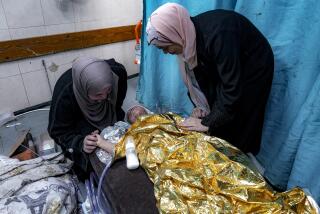AIDS Is Creating 16 Million Orphans in Africa, Experts Say
- Share via
WASHINGTON — The broad swath that AIDS is cutting through Africa is restructuring the pattern of family life there, experts said Saturday.
By the year 2015, at least 2.4 million women will die of AIDS every year in the countries south of the Sahara Desert, according to U.S. Census Bureau projections presented here at a meeting of the American Assn. for the Advancement of Science.
Because many of those women’s husbands also will die, AIDS will leave a total of 16 million orphans in the region, according to Census Bureau anthropologist Linda A. Valleroy. The number of orphans would be much higher, she said, but for the fact that 30% to 40% of all children born to mothers infected by the human immunodeficiency virus, or HIV, the virus that causes AIDS, are themselves infected.
In Europe, only 10% of children born to HIV-infected mothers are infected.
There are already 250,000 AIDS orphans in the region, Valleroy said. “In most areas, extended families can act as a safety net,” she noted, but in some regions, such as southern Uganda and northern Tanzania, “families can no longer cope.”
She cited one aging grandmother who is now caring for 14 grandchildren because their parents died of AIDS.
Zambia and Tanzania are particularly suffering from the effects of AIDS, added Peter H. Perine, a epidemiologist with the Uniformed Services University of the Health Sciences here. In Lusaka, Zambia, 60% to 80% of all hospital admissions are AIDS-related, he said. “It is overwhelming the health care system in the country.”
At least 22% of all women who gave birth at the main hospital in Lusaka in 1990 had been infected by HIV, he said. In 1985, the incidence was only 9%. “The number in men is likely to be just as high,” he added.
In some cities in Tanzania, 40% of the adult population is HIV-infected, according to demographer Peter O. Way of the Census Bureau. In Rwanda’s capital of Kigalli, the infection rate is 30.3%, he added.
More to Read
Sign up for Essential California
The most important California stories and recommendations in your inbox every morning.
You may occasionally receive promotional content from the Los Angeles Times.













